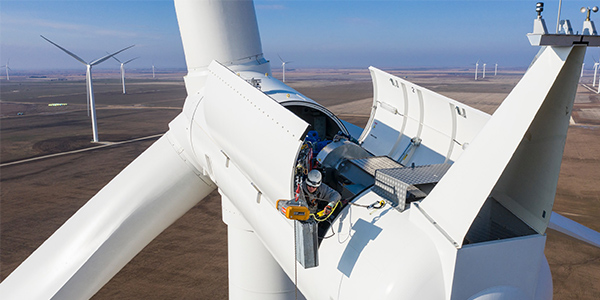Two FERC commissioners still have heartburn over a 2018 commission order reinstating MISO transmission owners’ rights to self-fund network upgrades.
Chairman Richard Glick and Commissioner Allison Clements expressed their concerns in a Feb. 8 order following MISO’s submittal of an unexecuted facilities service agreement (FSA) between itself, interconnection customer Walleye Wind and transmission owner Northern States Power Co. While FERC approved the unexecuted FSA for a 111-MW Minnesota wind farm, it opened old wounds over the appropriateness of TOs’ unilateral right to self-fund network upgrades (ER21-615).
Walleye Wind, a NextEra Energy Resources subsidiary, said it refused to execute the FSA and requested MISO file an unexecuted document because of “continued legal uncertainty regarding” TOs’ right to provide initial funding for the network upgrade that would accommodate the project.
Walleye said FERC could reverse its decision in the future, placing initial funding responsibility back on interconnection customers.
The company asked FERC to direct MISO to amend the FSA by including a provision for the possible reversal of TOs’ self-funding option. It asked that the FSA state that “changes will be undone if the legal premise for [transmission owner initial funding] is later eliminated.”
FERC declined to amend the FSA to incorporate such language, saying the document correctly reflects the state of MISO’s rules at the time.
Glick concurred with the FSA decision but wrote separately that giving TOs the option to “unilaterally choose whether to self-fund network upgrades constructed on behalf of affiliated and nonaffiliated interconnection customers” could be unfair. He said the commission “failed to meaningfully wrestle with these concerns in its orders allowing transmission owners the unilateral right to choose up-front funding.”
Clements said that while she concurred with the decision, she is worried that FERC didn’t “adequately address the justifiable concern that those rules create an opportunity for generation-owning transmission owners to unduly discriminate” between assets they have an ownership interest in and those they don’t have an interest in.
She said that when interconnection customers have control of initial funding, they can finance at more favorable rates instead of reimbursing TOs for construction and a predetermined rate of return. She also said TOs’ unilateral right to self-fund ignores that the “vast majority of transmission owners do in fact still own generation.”
The commission should conduct a “more searching inquiry” of the issue, she said.
“While this topic has been the subject of litigation before this commission and the courts for several years, I believe we have more work to do,” Clements wrote. “A foundational principle of the commission’s work to open up access to the nation’s transmission grid over the past 25 years has been that when monopoly utilities are permitted to discriminate among affiliated and nonaffiliated customers, competition suffers and customers pay.”
She said that while the reasonableness of MISO interconnection rules was not the item in question, “they may well merit additional scrutiny in the near future.”
MISO in 2018 acted on FERC’s direction and reinstated TOs’ right to self-fund network upgrades necessary for new generation. FERC originally issued a 2015 order barring TOs from electing to provide initial funding for network upgrades, but that decision was remanded by the D.C. Circuit Court of Appeals. (See MISO Gauging Aftershocks of TO Self-fund Order.)
The move was unpopular with some MISO generation developers, who said it could pave the way for discrimination by TOs of some interconnection customers and increase the cost of new generation. But TOs’ ability to self-fund network upgrades survived a challenge last year from the American Wind Energy Association. (See FERC Upholds MISO Self-fund Order, Glick Dissents.)





